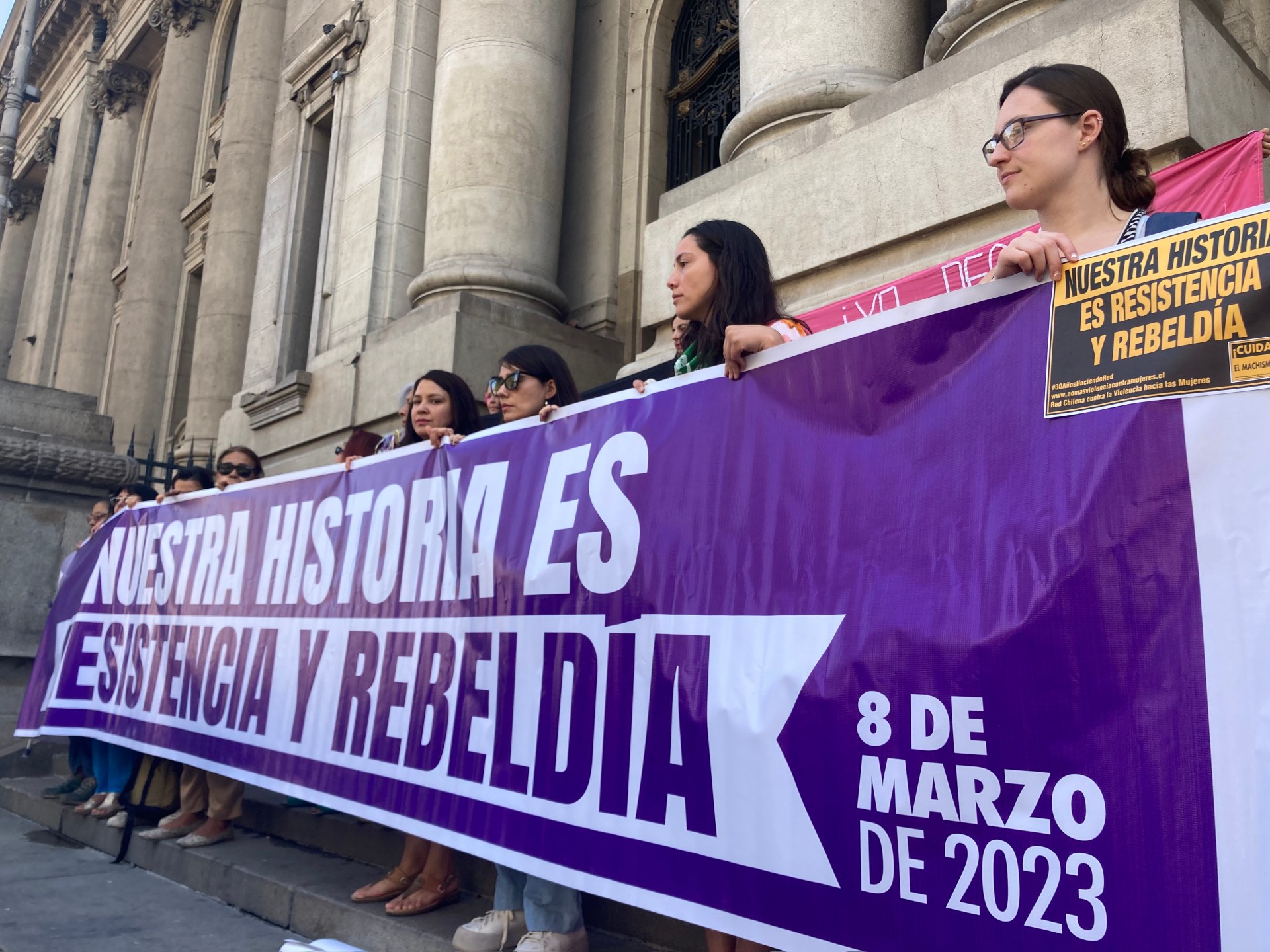Chile’s abortion rights movement faces uphill battle | Women’s Rights News
Santiago, Chile – Siomara Molina stands on the steps of the Chilean National Library on a busy street in the heart of Chile’s capital.
Waving fists in the air and wearing green scarves, symbolic of the Latin American movement for abortion rights, Molina and the dozens of women around her chant: “Abortion yes, abortion no, that’s my decision”.
Abortion is illegal in Chile, a traditionally Catholic country, except in three limited circumstances: nonviable pregnancies, rape or risks to a mother’s health.
And a years-long push by rights advocates to loosen those restrictions suffered a serious blow last year when Chileans rejected a new draft constitution that would have enshrined reproductive health and bodily autonomy as fundamental rights.
But despite the setback, as an estimated 400,000 women gathered to mark International Women’s Day in Santiago and other cities this week, access to safe, free and legal abortion remains one of the Chilean feminist movement’s key demands.
“Today’s framework is one of the most restrictive in the world. It does not give women the autonomy to make decisions,” said Molina, who is a part of Chile’s largest feminist collective, Coordinadora Feminista 8M, which campaigns for a myriad of gender equality causes.
“Breaking the social stigma is urgent, that we create actions that lead to dialogue and conversations,” she told Al Jazeera, affirming her belief in the power of protest. “The street belongs to us, and we will keep protesting.”

Pinochet legacy
This year is especially significant in the fight for abortion rights in Chile, as 2023 marks 50 years since General Augusto Pinochet staged a bloody coup and seized power. During his 17-year rule, Pinochet forced conservative, Catholic values on the country, and in 1989, a year before his regime ended, he prohibited abortion in all circumstances.
“The last thing Pinochet did was ban abortion, and since then there’s been a chain of violations against women and girls who cannot make decisions [over their own bodies],” Molina said. “We’ve tried to change the framework, but we live in a country shaped by the dictatorship.”
Still, in the last three years, Chileans have taken significant steps to break free from the late dictator’s enduring imprint on the country.
Triggered by rising costs of living, Chile was rocked by months of unrest in 2019, when Pinochet’s enduring 1980 constitution was singled out as a root cause of a lack of social welfare and gaping inequality. The social mobilisations pressured politicians to grant a referendum to rewrite the constitution in 2020, which almost 80 percent percent of Chileans approved.
The first draft of the new text was written by 154 popularly-elected representatives, who were largely independents representing social and environmental movements, including members of Coordinadora Feminista 8M.
The result was a highly progressive draft constitution that set out to enshrine equality and a range of human rights, but which critics dismissed as overly ambitious and complex. Consequently, the first draft was widely unpopular: 62 percent of voters rejected it in a 2022 general referendum.
“Women in the country lost a huge opportunity,” said 19-year-old student Antonia, who was among the thousands of protesters demanding abortion rights at the Women’s Day March in Santiago on Wednesday, and did not give Al Jazeera her last name.
”Maybe it wasn’t perfect, but it was a step in the right direction,” she said of last year’s proposed constitution. She said she knows many people who have resorted to at-home abortions using black-market pills.
Between 2017, when the three-exceptions law on abortion was passed, until January 2022, only 2,313 legal abortions were officially registered in Chile, well below expectations. Reproductive rights advocates say that people seeking abortions, even if their cases fall within the three allowed circumstances, continue to rely on underground networks due to stigma and judgement by medical professionals.
“The situation is complicated, expensive, and people need support. Legal abortion is a real necessity,” Antonia said.
Conservative parliament
Chile is currently in the process of drafting a second constitutional proposal. However, this time political parties are guiding the process and the result is expected to be more moderate, meaning reproductive rights could be left off the table.
For Molina and her peers, this is a worrying development: “There is a sense of hopelessness,” she said. “The 2022 draft opened a door [for us] through representation. Now [the process] is happening behind closed doors.”
So while Argentina and Colombia have passed laws to legalise abortion in recent years, the scenario in Chile remains uncertain. Despite a pro-abortion rights government being in power, parliament remains largely conservative.
In November 2021, deputies voted down a motion to decriminalise any abortion conducted at up to 14 weeks of pregnancy, with 62 deputies in favour and 65 against.
Chilean Women’s Minister Antonia Orellana admitted that the failure of the rejected constitution has caused setbacks for a promise by left-wing President Gabriel Boric’s administration to legalise abortion. Speaking to CNN, she said the government intends to present a new motion, “but probably not in this year”.
Meanwhile, an IPSOS study from 2022 found that 61 percent of Chileans believe that abortion should be legal within the first six weeks of pregnancy, although the number dropped to 36 percent at the threshold of 14 weeks.
“It will be difficult to pass [pro-abortion laws],” said Lieta Vivaldi, a lawyer and researcher specialising in sexual and reproductive rights at the Center for Applied Ethics in the faculty of philosophy and humanities at the University of Chile.
She told Al Jazeera that while the three-circumstances law is “absolutely insufficient”, it also has not been properly applied by health workers due to a lack of adequate training.

Stigma continues to be prevalent among medical workers, who reserve the right to be “conscientious objectors” and refuse to perform abortions, even within the three allowed circumstances, based on their personal beliefs. A survey of 57 public hospitals last year found that up to 49 percent of workers surveyed would exercise this right.
Vivaldi added that there is not enough information available to the public about abortion. Against this backdrop, she said the Women’s Day protests are “more important than ever” to destigmatise the procedure.
“We have to march with our green scarves because all of us have had abortions, or we know someone who has had an abortion,” she said. “It is a reality in Chile. We are here and we have to keep fighting.”





Pingback: 다시보기
Pingback: Clubbet168
Pingback: https://shop-uk.fmworld.com/Queue/Index?url=https://devs.ng/fast-recovery-after-a-volleyball-game/
Pingback: kojic acid soap
Pingback: beste borsten